#🫶 Ty for the ask srry for not being normal
Explore tagged Tumblr posts
Note
Hello! Anon Asker again here. Recently got through the latest volume on Kindle with the Dungeon Master arc.
(Spoilers ahead for others...?) Now that we got most of the characters' backstories, I feel the earlier black magic ritual they did for Falin makes a lot more sense.
Marcille is desperate to keep the people she loves alive given her sense of loss and persisting dread about outliving everyone she knows.
Laios (apart from loving his sister) has lingering guilt from having left Falin behind before, exacerbated by her sacrifice and the way she always puts him first.
Then there's Senshi and Chilchuck who have on more than one occasion shown a distaste for magic.
Yet Senshi didn't fight it much and stood by them, because he himself is not a stranger to loss, especially when it comes to loved ones who have sacrificed for others so that one might survive.
But Chilchuck I'm not so sure. He was the most vocal in how against black/ancient magic he was, but also didn't really stop it. Maybe we can attribute it to his own abandonment issues by his wife, or just that he could imagine what it might be like if it was one of his daughters (as we saw in a small chapter art where he had a nightmare of his daughters dead). But I wanted to hear your take on this if in case you do.
Sorry for taking so long to get back to this ask! It’s a layered topic so I procrastinated on polishing my answer.
I think this is super interesting! Especially because we’re coming at this from totally different angles, since reading the manga I never thought that using dark magic didn’t make sense considering the situation or was weird. You’re coming at this at an angle of what personal reasons would make a character do this, while I looked at it in an angle of what social reasons would make a character let it happen. Post gonna be a lil long so I put it under cut! Tldr with your angle though, I think you’ve pretty much got it spot on and I don’t have much to add, I think your take it’s very interesting, and true.
So, why not do dark magic?
Throughout the whole manga, very early on too, we see our characters testing their society’s perception on morality in ways that we see that the moral wall was pretty baseless in the first place, mainly the disgust towards eating monsters for instance. Or sometimes, the morality of characters is lacking to our standards, having a perception we’d see as twisted, like in the kobold extra. Like Marcille talks about in the barometz/direwolves chapter, eating something "filthy" will make you filthy too and that’s why Marcille was innately so opposed to eating monsters. We also see it with the orcs’ chapter for example, Kui tackles a lot of difficult themes with nuance like racism, both the orcs and the elves have their perspective and their big faults in their part in their conflict, but in the end who’s right and who’s wrong isn’t spelled out for the readers. The point is that morality in the manga isn’t set in stone, it’s something that as the reader you draw the line on yourself, and we see that our characters aren’t infallible moral compasses either. The use of magic, too, is left up in the air on how good and moral it is to use, "unnatural" vs efficent vs cheap cop-out vs harmless or harmful.
So for me, when Marcille explained dark magic, how it works and why it’s forbidden, ‘yeah there’s probably a hidden catch in there’ I thought but I was super on board with it. To me, not using dark magic because it’s different and less known would be like not wanting to eat monsters for the same reason: more born out of fear and ignorance than reasonable and rational.
So we’re coming at this from different angles like I said, while you focused on character motivations for being fine with such an unholy act of magic I thought of it in an ambiguous morality and consequences way. So instead of "why should/would they do it?" to me it’s "why not?". And to me it’s a bit like "Well, no one should steal! But if the person really needs to for food, well I could let it go" for the characters’ thought process, though of course the instinctive revulsion and the stakes are much higher. They have all worked really hard to get there, and if there’s a chance it’ll go well then they would try it. Senshi and Chilchuck are much more reticent than the others like you said, but they’re able in the end to either rationalize doing it enough, or just prefer to listen to the directives and see how it goes by taking a more passive role. Not unlike how peer pressure can get you to participate in something you don’t want to do. But to me it’s a lot about growing accustomed to the unknown, hearing about it from Marcille who researches dark magic instead of the half-foot anecdotes about "dark elves" and "dark magic" used to nefarious ends. Which, presumably dark elves don’t even exist, we don’t know exactly what the half-foot definition of dark elves is, it’s a misconception and it’s a boogeyman, which is part of my point.
Where does Chilchuck’s distaste of magic come from? Elves. But by then Marcille, by being an elf herself and being trustworthy and friendly thus far, has started to chip away at these preconceived notions. Maybe what he heard wasn’t foolproof, after all. Under pressure and stakes like they were, people with even an usually very rigid morality may bend a little, steal, etc. To me, even if Chilchuck brought it up later, still very uneasy with it, it didn’t mean that him doing it was unrealistic or weird. People do things half-heartedly or unsure on if it’s the right thing to do sometimes, especially under pressure. Their will wavered while Laios and Marcille’s didn’t, and ultimately that’s what decided what they would do. What’s the other option? Marcille and Laios weren’t going to back down, so what, fight them so they don’t do it? Otherwise they’ll do it anyways with or without you, and then is there even a point to putting up a fight about it or even leaving? You can see the raationalization being done in real time, if you reverse engineer it.
Ironically enough I think this scene set after they do it depicts it perfectly: Chil lays out why he doesn’t like the thought of it, she responds on why dark magic being bad is up for debate, and he goes to argue but ultimately chooses not to and goes along with the group.
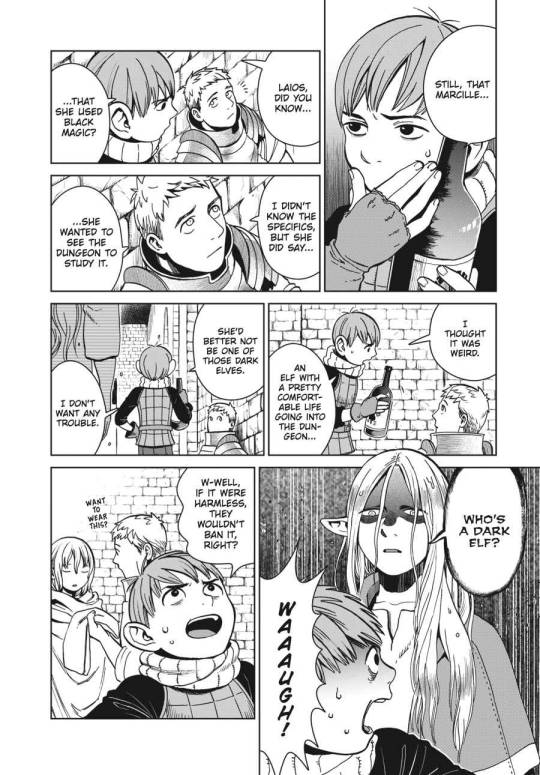

But yes it’s an interesting topic! Marcille researches positive uses for ancient magic so of course she’d be ready to use it to revive Falin, Laios has normalized reviving and magic a lot and overly relies on it, and Senshi doesn’t want to do it, but it’s because of his ideal- because of his instinctive recoil at anything that is magical or "unnatural"… Except for the golems. Because of how he sees himself as part of a larger ecosystem and cycle of life that humans shouldn’t have control over, that should know how to sustainably live with nature without getting greedy or cocky… Except for when he idealized Anne the kelpie as his best friend that even though is a monster would never hurt him. He tends to pull away from others socially needlessly, not letting himself grow too close to people or a community, too. Point is, Senshi has his pitfalls and isn’t as inflexible as we might think, and not everything he does is rational or even consistent with his own beliefs under his normal circumstances, though I do think he’s the one who was/should be the most opposed to the reviving character wise.
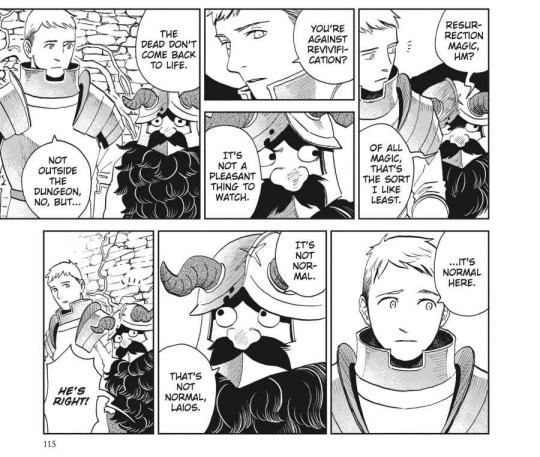
And I said that Chilchuck’s reason for not liking dark magic is rooted in superstitions and elves and history- and that’s certainly true but it isn’t the full story either. While Senshi’s preoccupied about morals and his world view, Chilchuck is SCARED of it, he thinks of the CONSEQUENCES, not the act itself (though it also def doesn’t charm him either). And not just the direct consequences of what a dark magic resurrection means either, it comes up a lot that Chilchuck is worried for others and for himself, about careers or the law and generally the future, and tends to micromanage them or be on their case because of it. Made a lil compilation below, notice the trend, he’s very focused on what others will do if they learn that they did dark magic, he’s focused on hiding that they did, not grappling with the morality of it as much. He’s very worried about the legality of it. He sees it as a crime but not something that shatters his worldview y’know. And even after Marcille did it and uncovered that she researched dark magic, he still trusts her and her judgement, is only wary of her a but for a bit before going right back to being thick as thieves together.
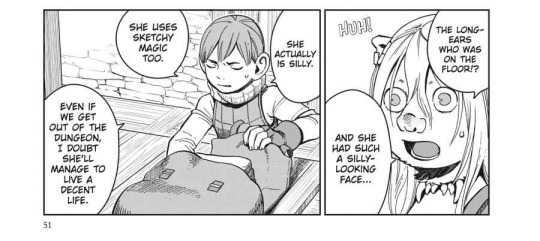
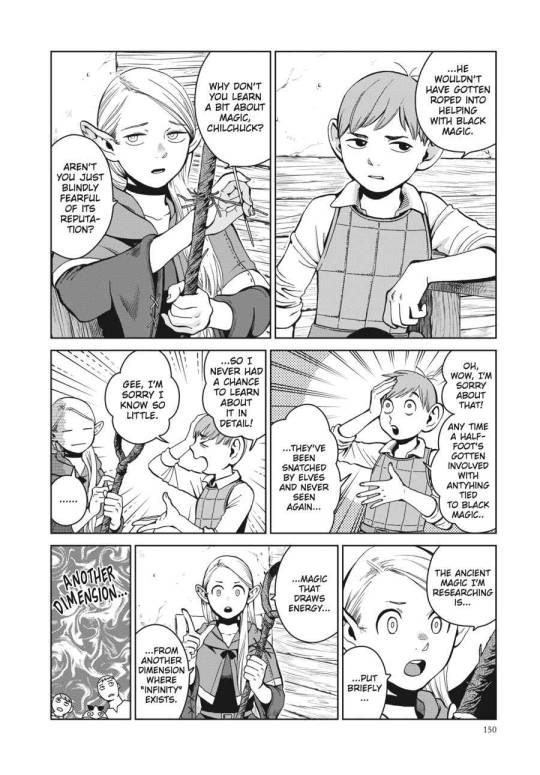

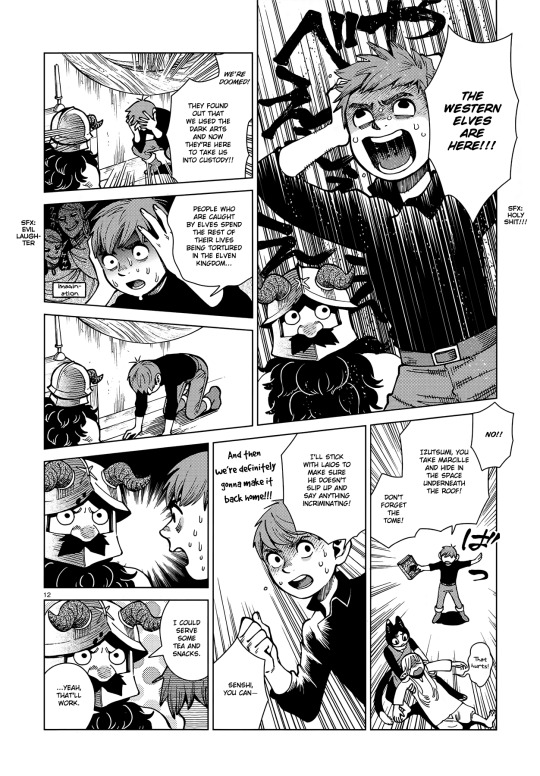

I was gonna talk about racism as a plot point and through arcs in the series here but I think I made my point without it, so that’ll be a topic for another day. But yeah… Spoilers for the last volume stop here and skip to the last paragraph if you still haven’t read ut all (bless your Kindle reader soul, good luck waiting for the next chapters). Is the winged lion bad? He’s harmful, certainly, but he’s not evil, and at its base it’s an entity without a sense of morality. Dunmeshi tackles morality in a really interesting, typical of seinens way, and unity is another big theme, as much as racism is a narrative tool and plot point the lesson is that putting efforts into befriending people you don’t understand is good. And with some, like the winged lion, that’s not gonna pay off, but everyone deserves to be understood regardless. Narratively that’s why Laios is the character he is, and why we get to learn about Kabru, the orcs, the canaries, Thistle, even the demon, and see it under new lights. Kui is big on critical race theory and sociopolitical issues used in/for storytelling, and it shows. During canon Chilchuck is growing closer to an elf coworker and tentatively giving her his trust, which pays off, and that is enough to make him reconsider wether dark magic is that bad, and think of how much risk he’s willing to get into for the party. Whew got sidetracked by the narrative genius of Dunmeshi and Kui but, the point is that in the story, characters changing their mind on issues and having their viewpoints challenged is very much common and important.
Sooo yeah! As I said I do enjoy your perspective as well, I’d never thought of it that way so it was interesting. Hopefully this is an insightful post and not just a load of nothing that wasn’t relevant to your question haha. But yeah, while reading I truly approached it from a "why not" angle, instead of a "why yes". They don’t like the method but they do want Falin to live, which makes it easier to dirty their hands for. Wash your hands of it and don’t think about it too much afterwards. (Top 10 reasons why it’ll backfire! none of them will surprise you 🌟)
#Ask#dungeon meshi#delicious in dungeon#meta#analysis#i don’t think i’ll tag specific characters for this one#🫶 Ty for the ask srry for not being normal#Spoilers#dungeon meshi manga spoilers
27 notes
·
View notes